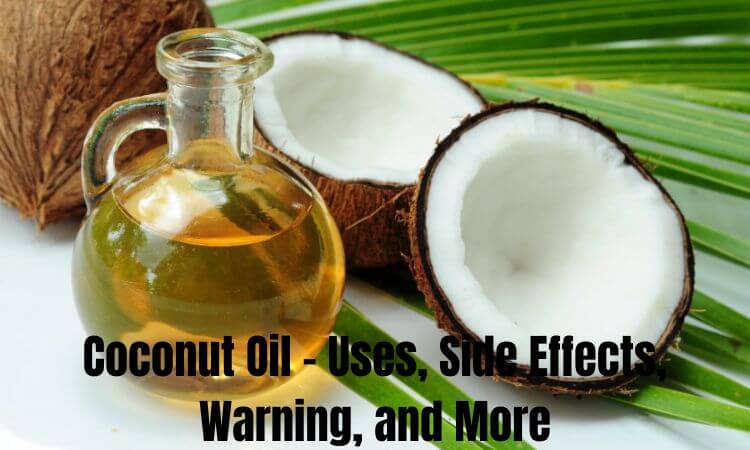Table of Contents
Coconut Oil – Uses, Side Effects, Warning, and More
coconut oil for skin,coconut oil benefits,coconut oil for cooking,coconut oil price,coconut oil uses,drinking coconut oil in the morning,coconut oil capsules,virgin coconut oil,coconut oil for skin,coconut oil for hair,coconut oil benefits,coconut oil for body,coconut oil for cooking,coconut oil capsules
Overview
The nut or fruit of the coconut palm is where coconut oil is derived from. It includes capric acid, caprylic acid, and lauric acid among its medium-chain fatty acid content.
Medium-chain fatty acids make up anywhere from 52–85 percent of coconut oil. These saturated fats are what gives coconut oil its characteristic flavour. When applied to the skin, it possesses a hydrating and soothing effect.
Coconut oil is a common treatment for eczema, and it also promotes growth in preterm infants. Psoriasis, obesity, breast cancer, heart disease, multiple sclerosis, and a variety of other ailments are all treated with it, despite the fact that there is little evidence to support this usage from a scientific standpoint.
Uses & Effectiveness
Possible Beneficial Effects on Eczema (atopic dermatitis). When applied to the skin, coconut oil has been shown to be more effective than mineral oil in reducing the symptoms of eczema in children.
The process of maturation and development in preterm newborns. Applying coconut oil to the skin of premature infants has the potential to help their general growth, as well as their body temperature, breathing, and skin health.
DO NOT MISS: Calcium – Uses, Side Effects, Warnings, and More
There is a growing interest in employing coconut oil for a variety of additional applications; however, there is insufficient trustworthy data to determine whether or not this could be beneficial.
Side Effects
When ingested, coconut oil is often consumed through the consumption of foods. However, saturated fat, which is included in coconut oil, has been shown to contribute to a rise in cholesterol levels. As with the consumption of any other saturated fat, it should be done so in moderation. When used as a treatment for a limited amount of time, coconut oil might not pose any health risks. It seems to be safe to consume coconut oil in quantities of 10 millilitres two or three times each day for a period of up to a year.
When used topically to the skin, coconut oil is probably not harmful in any way.
Special Precautions and Warnings
When ingested, coconut oil is often consumed through the consumption of foods. However, saturated fat, which is included in coconut oil, has been shown to contribute to a rise in cholesterol levels. As with the consumption of any other saturated fat, it should be done so in moderation. When used as a treatment for a limited amount of time, coconut oil might not pose any health risks. It seems to be safe to consume coconut oil in quantities of 10 millilitres two or three times each day for a period of up to a year.
When used topically to the skin, coconut oil is probably not harmful in any way. Coconut oil is a frequent ingredient in dishes, and women who are pregnant or nursing should avoid consuming it. There is not enough trustworthy information available to determine whether or not using coconut oil as medication while pregnant or breastfeeding is safe. To be on the safe side, keep to the established food amounts.
When used on the skin for approximately one month, children may use coconut oil without any adverse effects. There is not enough trustworthy information available to determine whether or not coconut oil, when taken orally as a medicine, is suitable for use in children.
Coconut oil is known to raise cholesterol levels due to the presence of a specific type of fat within its composition. The consumption of meals on a regular basis that contain coconut oil may lead to an increase in levels of low-density lipoprotein, also known as “bad” cholesterol. People who already have high cholesterol levels could potentially have an issue with this.
Interactions
At this time, we do not have any information regarding COCONUT OIL’s interactions.
YOU MAY LIKE THIS: Astaxanthin – Uses, Side Effects, Warnings, and More
Dosing
Adults have often taken coconut oil in doses ranging from 20 to 60 millilitres (mL) orally, once or twice daily, for a maximum of four months. Additionally used on the skin as a topical oil or moisturiser, coconut oil can be found in certain types of cosmetics. Talk to a medical professional about your symptoms to find out what kind of treatment and dosage would work best for your particular problem.
When referring to coconut oil goods, the term “virgin” coconut oil is sometimes used. This designation typically indicates that the products have not been bleached, deodorised, or processed. However, there are no particular standards that govern the industry. When referring to coconut oil, the phrase “cold pressed” indicates that the oil was extracted through pressing without the use of any heat.



